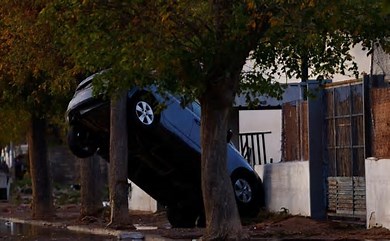
Spain faced a tragedy of unprecedented scale as devastating floods swept through several regions, claiming at least 158 lives. The floods, triggered by a powerful Mediterranean storm on Tuesday, unleashed torrents of water that devastated homes, uprooted lives, and left many missing. Officials in Valencia have reported 155 fatalities, while Castilla-La Mancha and Andalusia have recorded three additional deaths.
Prime Minister Pedro Sanchez urged residents in affected areas, particularly in Valencia and Castellon, to stay indoors and heed emergency instructions. “The priority now is to save as many lives as possible,” Sanchez emphasized, urging people to avoid further risks amid the ongoing rescue operations. King Felipe VI echoed this concern, stressing that the emergency situation is “still not over.”
Flags were lowered to half-mast, and Spain began three days of national mourning for the victims of the floods—the deadliest in decades. AEMET, Spain’s national weather agency, placed multiple regions under high alert, warning of further rains. Across Spain, minutes of silence were observed in honor of the lives lost, while hundreds of displaced residents sought shelter in temporary accommodations.
In the Valencia suburb of Paiporta, residents like Eliu Sanchez recounted harrowing tales of survival. Sanchez described witnessing people clinging to trees and vehicles as floodwaters surged, carrying debris, vehicles, and even people with it. The destructive force left entire neighborhoods buried in mud, with scenes of cars stacked and streets turned to rivers.
Paiporta resident David Romero painted a grim picture of the city’s devastation: “Neighborhood after neighborhood, street after street—there is not a business standing.” Transport disruptions are widespread, with the high-speed rail line between Madrid and Valencia expected to remain closed for up to three weeks, according to Transport Minister Oscar Puente.
As Spain deals with the catastrophe, criticism is emerging over emergency response times. Some residents voiced concerns about delayed flood warnings, claiming they arrived only when the local river had already overflowed. This critique, shared by locals like 21-year-old Joaquin Rigon, has led to political tension. The Valencia region’s conservative leader initially appeared to shift blame to the central government, while Spain’s Interior Ministry clarified that regional governments hold responsibility for managing civil protection measures.
As Spain copes with the aftermath of this disaster, scientists point to climate change as a key factor. Human-driven climate shifts have intensified the frequency and unpredictability of extreme weather, heightening the risk of severe floods and storms like the one that swept across Spain.















